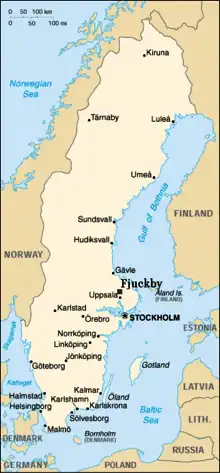Rootsi
Estonian

Etymology
From archaic roots (“Swede”), from Proto-Finnic *roocci [1] (around 8th-9th century AD; very late, possibly even post-Proto-Finnic), borrowed from Old East Norse *roþs- (“related to rowing”) (compare Old Swedish *roþs-, modern Swedish ro (“to row”)), possibly as part of the word rōþskarl, rōþsmän (“rower”). The name is also connected to Old Norse Roþrslandi (“the land of rowing”), the older name of Roslagen.[2] The word is ultimately from Old Norse róðr (“steering oar”), from Proto-Germanic *rōþrą (“rudder”), from Proto-Indo-European *h₁reh₁- (“to row”).
Finnic cognates include Finnish Ruotsi, Livvi Ruočči (“(Lutheran) Finland”), Veps Ročinma and Võro Roodsi. Old East Slavic Русь (Rusĭ) (whence Byzantine Greek Ρωσσία (Rōssía)), the original form of the endonym of Russians that originally referred to a tribe of Varangians, is borrowed from Finnic.
Pronunciation
- IPA(key): /ˈroˑtsi/, [ˈroˑtsʲi]
- Rhymes: -oˑtsi
- Hyphenation: Root‧si
Proper noun
Rootsi (genitive Rootsi, partitive Rootsit)
- Sweden (a country in Scandinavia in Europe)
- the name of some villages in Estonia
Declension
| Declension of Rootsi (ÕS type 16/pere, no gradation) | |||
|---|---|---|---|
| singular | plural | ||
| nominative | Rootsi | — | |
| accusative | nom. | ||
| gen. | Rootsi | ||
| genitive | — | ||
| partitive | Rootsit | — | |
| illative | Rootsisse | — | |
| inessive | Rootsis | — | |
| elative | Rootsist | — | |
| allative | Rootsile | — | |
| adessive | Rootsil | — | |
| ablative | Rootsilt | — | |
| translative | Rootsiks | — | |
| terminative | Rootsini | — | |
| essive | Rootsina | — | |
| abessive | Rootsita | — | |
| comitative | Rootsiga | — | |
References
- Rootsi in Sõnaveeb (Eesti Keele Instituut)
- “Rootsi”, in [EKSS] Eesti keele seletav sõnaraamat [Descriptive Dictionary of the Estonian Language] (in Estonian) (online version), Tallinn: Eesti Keele Sihtasutus (Estonian Language Foundation), 2009
- Kallio, Petri: The Diversification of Proto-Finnic Joonas Ahola & Frog (eds.), Fibula, Fabula, Fact: The Viking Age in Finland, pp. 155-168. Studia Fennica Historica 18 (2014)
- “Rootsi”, in [ETY] Eesti etümoloogiasõnaraamat [Estonian Etymological Dictionary] (in Estonian) (online version), Tallinn: Eesti Keele Sihtasutus (Estonian Language Foundation), 2012
Ingrian

Etymology
From rootsi.
Pronunciation
- (Ala-Laukaa) IPA(key): /ˈroːt͡si/, [ˈroːt͡s̠ʲ]
- (Soikkola) IPA(key): /ˈroːt͡si/, [ˈro̝ːt͡si]
- Rhymes: -oːt͡sʲ, -oːt͡si
- Hyphenation: Root‧si
Declension
| Declension of Rootsi (type 5/lehti, no gradation) | ||
|---|---|---|
| singular | plural | |
| nominative | Rootsi | Rootset |
| genitive | Rootsen | Rootsiin, Rootsiloin |
| partitive | Rootsia | Rootsija, Rootsiloja |
| illative | Rootsee | Rootsii, Rootsiloihe |
| inessive | Rootsees | Rootsiis, Rootsilois |
| elative | Rootsest | Rootsist, Rootsiloist |
| allative | Rootselle | Rootsille, Rootsiloille |
| adessive | Rootseel | Rootsiil, Rootsiloil |
| ablative | Rootselt | Rootsilt, Rootsiloilt |
| translative | Rootseks | Rootsiks, Rootsiloiks |
| essive | Rootsenna, Rootseen | Rootsinna, Rootsiloinna, Rootsiin, Rootsiloin |
| exessive1) | Rootsent | Rootsint, Rootsiloint |
| 1) obsolete *) the accusative corresponds with either the genitive (sg) or nominative (pl) **) the comitative is formed by adding the suffix -ka? or -kä? to the genitive. | ||
References
- L. G. Terehova, V. G. Erdeli (1936) P. I. Maksimov and N. A. Iljin, transl., Geografia: oppikirja iƶoroin alkușkoulun neljättä klaassaa vart (toine osa), Leningrad: Riikin Ucebno-Pedagogiceskoi Izdateljstva, page 46